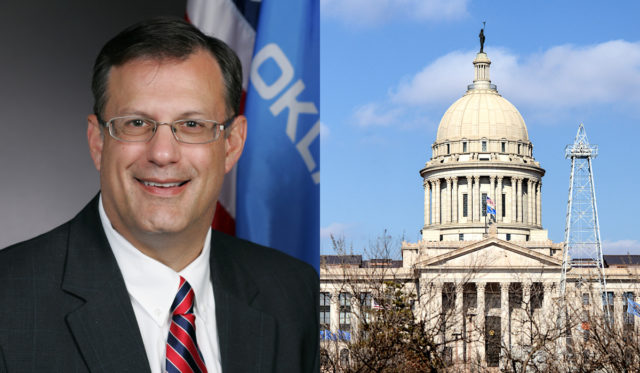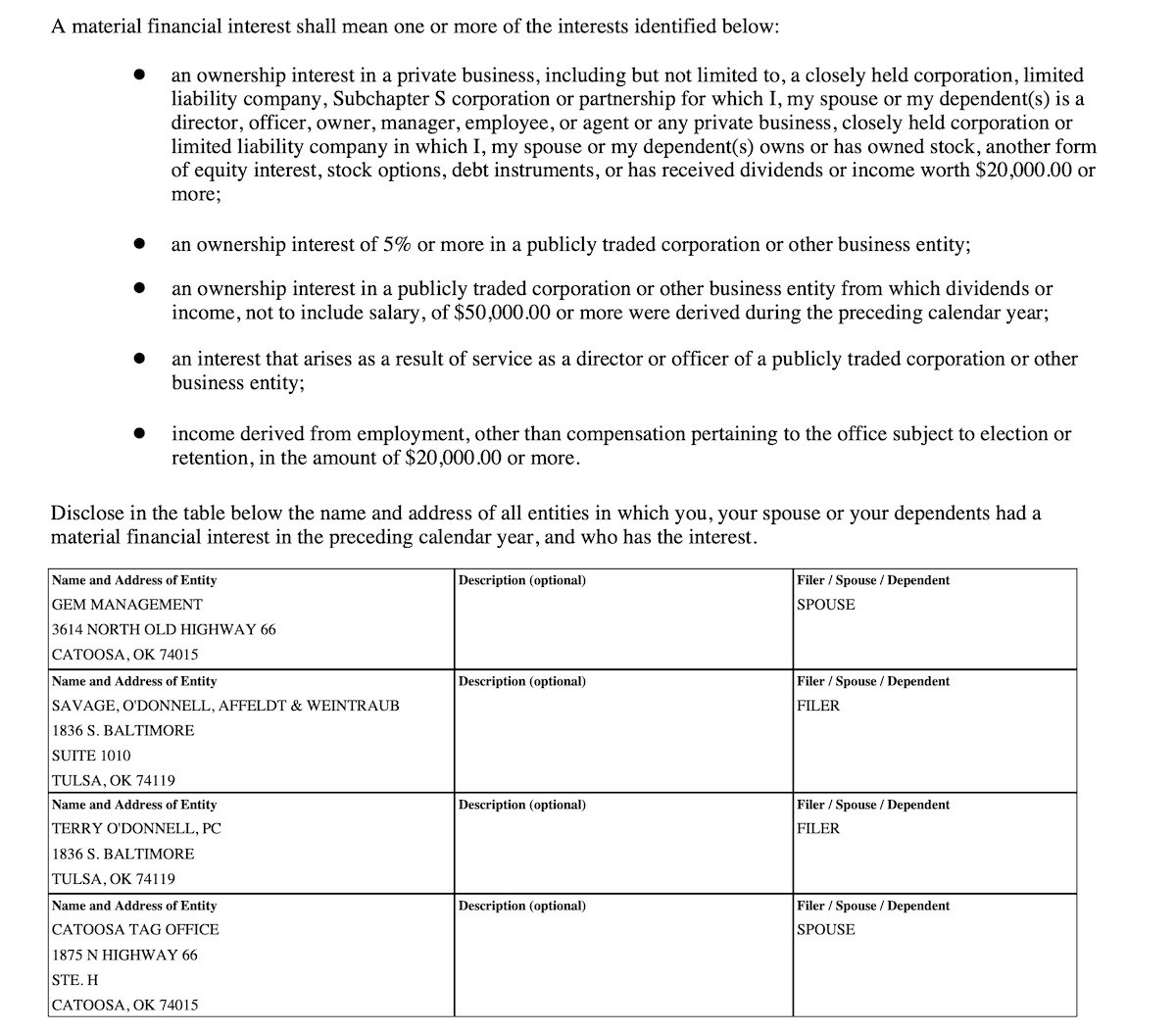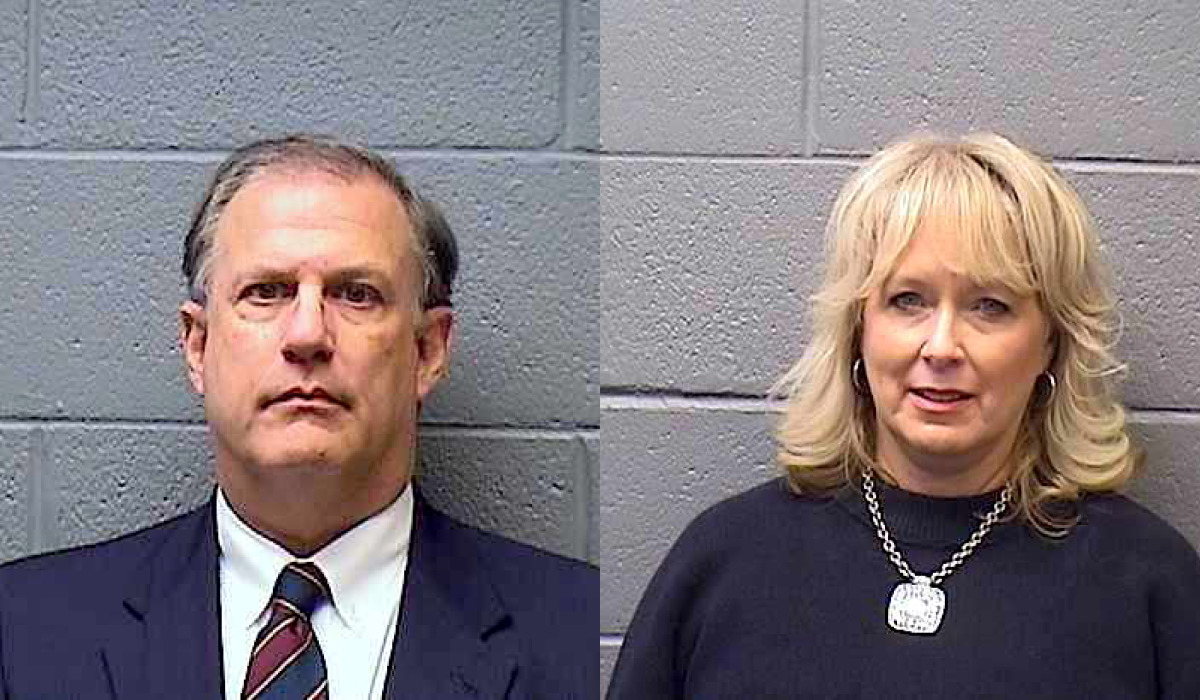

Criminally indicted Rep. Terry O’Donnell completed the Oklahoma County booking process at the Midwest City Jail on Thursday and released a statement blaming “political operatives” with a “personal vendetta” for prosecuting him and his wife “to discredit our family’s character and destroy our reputation.”
“But their attacks won’t work,” O’Donnell said in a statement that employed all-caps for emphasis. “My wife and I are INNOCENT, and WE WILL FIGHT BACK and vigorously defend our integrity.”
O’Donnell said he was resigning as House speaker pro tempore — the body’s second-ranking leadership position — effective Feb. 2, but that he would remain in the Legislature.
Meanwhile, Gov. Kevin Stitt and Senate Appropriations and Budget Chairman Roger Thompson have confirmed to NonDoc that the bill O’Donnell ran that changed state law and allowed his wife’s appointment as a tag agent was communicated as a 2019 policy “priority” of House Republican leadership.
O’Donnell (R-Catoosa) and his wife, Teresa, were indicted by a grand jury Dec. 17 on a combined eight criminal counts for an alleged conspiracy in which O’Donnell used his legislative role to legalize Teresa O’Donnell’s ability to succeed her ailing mother in the lucrative role of Motor License Agent in Catoosa. As part of the alleged conspiracy, Terry O’Donnell authored and pushed HB 2098, which repealed the prohibition of legislators or their immediate family members being named state tag agents within two years of their legislative service.
After the bill passed and was signed into law April 29, Terry O’Donnell had a conversation with the director of the Tax Commission on July 28 and emailed his mother-in-law’s resignation as tag agent and his wife’s application to the Oklahoma Tax Commission on July 29. The Tax Commission voted Aug. 1 to approve Teresa O’Donnell’s appointment as tag agent, and she signed a contract with the agency the same day.
NonDoc recently asked Stitt, who signed the bill, whether House leadership had communicated that O’Donnell’s bill was one of their priority measures that year. The governor laughed, paused for an extended time and eventually answered in the affirmative.
“Probably so. Yeah, probably so,” Stitt said. “That’s been a long time ago.”
Stitt declined to reveal the extent to which he considered vetoing O’Donnell’s bill.
“I signed the bill, but there’s always discussions behind the scenes, and I always am trying to figure out what’s going on with this legislation and is it going to be the best thing for Oklahomans,” Stitt said. “Ultimately, I signed the bill, and the Legislature put it before me.”
Thompson, whose role as appropriations chairman makes him one of the three most influential members of the State Senate, was the upper chamber’s author on O’Donnell’s HB 2098. He also said that House leadership designated O’Donnell’s bill as priority legislation for their side of the Capitol, something Senate and House leaders typically acknowledge either publicly or privately during session negotiations.
“Yes,” Thompson said. “I think so, yes.”
Thompson said he did not know of O’Donnell’s familial situation with the Catoosa Tag Agency when he agreed to carry the bill in the Senate.
“I might have had some questions about it, concerning it,” Thompson said. “I try to make sure that I don’t do anything that really affects the businesses that I’m involved in, and I think we all took an oath to be able to do that.”
Acknowledging a ‘material financial interest’

In addition to taking an oath of office that they will not knowingly receive “directly or indirectly, any money or other valuable thing, for the performance or nonperformance of any act or duty pertaining to my office,” O’Donnell and all lawmakers also are required annually by the Oklahoma Ethics Commission to disclose any prior-year “material financial interest” held by themselves, their spouses and their dependents.
In his disclosure of 2020 material interests, O’Donnell listed Teresa O’Donnell’s interest in Catoosa Tag Office and in GEM Management Group, a company she formed in April 2020. But in O’Donnell’s disclosure for 2019 — the year his wife became a tag agent in August — O’Donnell did not list the tag agency as a material interest. For his 2015 filing, however, O’Donnell listed his spouse as earning more than $5,000 from the Catoosa Tag Office.
On the Ethics Commission’s forms, O’Donnell marked affirmatively next to a series of ethical acknowledgements, including one regarding “private gain”:
I understand that elected state officers cannot use his/her State office (1) for his/her own private gain; (2) for the endorsement of any product, service or enterprise; (3) for the private gain of a family member or person with whom he/she is affiliated in a nongovernmental capacity, including nonprofit organizations of which he/she is a member or officer; or (4) for the private gain of persons with whom he/she is seeking employment or business relations.
Terry O’Donnell: ‘This is retribution’

Thursday night, O’Donnell said his indictment by the Oklahoma County grand jury led by District Attorney David Prater is “retribution.”
“This all started when I sought to hold some very influential people accountable for gross abuses of power. This is retribution,” he said in his statement. “Although I can’t get into the details of the case, I can only say we look forward to our day in court and to light being shined on the facts that have been grossly distorted or completely omitted.”
O’Donnell, an attorney, said he would remain in the Legislature but was resigning from his leadership role to prevent his case from being a distraction to the Oklahoma House of Representatives.
“This is the same Washington D.C.-style partisan politics that has attacked our freedoms, values, national history, law enforcement, churches, economy and more,” O’Donnell said. “And just like voters reject these constant attacks — just like they reject the constant attacks on President Trump — I believe Oklahomans will do the same in this case.”
O’Donnell said his legislative service would continue to include standing “against Biden’s federal overreach, against prosecutorial misconduct used for political purposes, and I will defend our values.”
“People who know us understand fully that my wife’s mother and grandmother ran the Catoosa tag agency for over 60 years,” O’Donnell said. “Service is a family legacy, not a crime.”
House Speaker Charles McCall (R-Atoka) is one of O’Donnell’s closest friends in the Oklahoma Legislature. McCall testified before Prater’s Oklahoma County grand jury in December prior to O’Donnell’s indictment and released a statement Friday regarding O’Donnell’s decision to resign from the second-ranking leadership position in the House.
“Rep. O’Donnell made the right decision for the institution at this time,” McCall said.
Asked whether O’Donnell’s HB 2098 was a House leadership priority bill in 2019 and whether McCall knew Teresa O’Donnell’s mother was a tag agent and that she was attempting to succeed her mother in that role, McCall’s senior communications advisor said the speaker could not comment on the matter “due to court orders.”
The “order directing non-disclosure” sent to witnesses of the Oklahoma County grand jury specifies that witnesses like McCall “will not disclose to third parties the subject, substance or nature of the questions posed to the witness, nor the answers given, nor any documents provided by the witness to this grand jury, nor any documents/exhibits shown to the witness by this grand jury during the witness’ testimony.”
But nothing in the grand jury order prohibits McCall from speaking about his personal knowledge at the time the bill was considered in the Legislature.
Stitt: ‘That’s not what we’re here to do’
While he was less certain in his recollection of whether he almost vetoed O’Donnell’s bill in 2019, Stitt offered his assessment of the ethical issue facing the influential lawmaker.
“There should never be a bill that’s authored by someone who has a vested interest,” Stitt said. “In business, you have to abstain or disclose that you have a vested interest in this industry or that industry. And we need to make sure that we are doing the people’s business here. We can’t come as elected leaders and then try to benefit our industry. That’s wrong, and that’s not what we’re here to do.”
Stitt said he wants questionable political behavior to be examined.
“I want all corruption exposed in state government. I’m trying to shine a light everywhere I go to make sure that we expose things that happen in state government, wherever it is: the judiciary, the Legislature, the executive branch,” he said. “I’m auditing different state agencies in the executive branch to try to expose anything that I think is not in the best interest of the taxpayers. That’s my whole job.”
Thompson, who carried O’Donnell’s bill in the Senate, said he did not recall anything out of the ordinary regarding the measure working its way through the legislative process.
“There was no unusual conversation during that time. It was just an avenue that we could say, ‘Can we as the Legislature, our families be involved as tag agents?'” Thompson said. “I didn’t see any red flags at the time moving through with it. I don’t know what’s going on with the indictment. I have not read the indictment or anything along those lines.”
Prater’s grand jury is expected to return to session this month.
“Owing to the fact the investigation and prosecution are ongoing, I am not able to comment at this time,” Prater said.




















